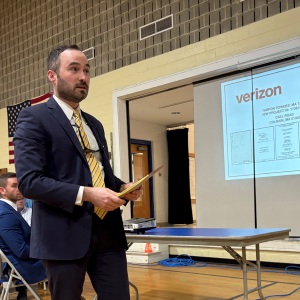Beacon Hill Roll Call: Feb. 3 to Feb. 7, 2025

Secretary of Labor and Workforce Development Lauren Jones announces more than $850,000 in grants to fund organizations that provide job training, employment placement and post-placement services for 119 young adults with disabilities. Among the recipients was the Polus Center for Social & Economic Development in Athol, which received $199,991. CONTRIBUTED PHOTO/LUCILA J. SANTANA
|
Published: 02-14-2025 8:49 AM
Modified: 02-14-2025 6:52 PM |
Beacon Hill Roll Call records local representatives’ votes on roll calls from the week of Feb. 3 to Feb. 7. There were no roll calls in the Senate last week.
The House, 126-26, approved and sent to the Senate a fiscal year 2025 supplemental budget that includes $425 million to fund the state’s family shelter system and make some changes to tighten eligibility. The vote was almost strictly along party lines with all Republicans voting against it and all but two Democrats voting for it. The Democrats say the measure makes major reforms while the GOP says the bill doesn’t go far enough.
“From the beginning of the shelter system crisis, the House has worked to reform the emergency assistance program to ensure that it remains financially viable,” said House Speaker Ron Mariano, D-Quincy. “That’s why the House led the effort to cap the maximum length of stay and to require job training programs for folks in the shelter system — reforms that this supplemental budget builds on. By creating stricter eligibility requirements along with increased security measures, this supplemental budget is the latest iteration of the House’s continued commitment to protecting vulnerable children and families in Massachusetts in a fiscally sustainable manner.”
“Over the past several years, as the population of the emergency shelter system has grown, the House has attempted to uphold the commonwealth’s right-to-shelter law while also being mindful of the long-term fiscal sustainability of the program,” said Rep. Aaron Michlewitz, D-Boston, chair of the House Committee on Ways and Means. “The reforms contained in this bill will ensure that right to shelter is maintained by further capping the length of stay and verifying eligibility, while also enacting stricter background checks on those who enter the shelter system to better protect the families who need these services the most.”
“I voted against [the bill] because Massachusetts cannot continue pouring taxpayer money into the emergency shelter system without implementing real, lasting reforms,” said Rep. Steven Xiarhos, R-Barnstable. “As a former police officer with 40 years of experience, I know firsthand how proper criminal background checks should be conducted, and the simple CORI check outlined in this bill doesn’t even come close. Without comprehensive background screenings at the state, federal and international levels, we risk compromising public safety and failing to protect the communities we serve.”
“Though there were some small reforms to the shelter system, they were only temporary and fell far short of what was necessary to address the problems associated with the program,” said Rep. Joseph McKenna, R-Sutton. “Without substantial and permanent reforms, many of which were proposed by Republican amendments that were unfortunately rejected out of hand without even cursory consideration, this was not a bill that will adequately address the long-term financial stability of the EA shelter program, so it was not a bill I could support.”
A “Yes” vote is for the bill.
Rep. Natalie Blais — Didn’t Vote
Article continues after...
Yesterday's Most Read Articles
Rep. Aaron Saunders — Yes
Rep. Susannah Whipps — Didn’t Vote
The House, 26-125, rejected an amendment that would expand the background checks that the state must conduct on emergency assistance shelter applicants by mandating universal criminal background checks that include criminal records at the state, federal and international levels; immigration or residency status; and presence on international or domestic criminal watch lists.
“While the underlying bill requires individuals applying for emergency assistance housing benefits to disclose prior criminal convictions and calls for CORI checks to be conducted prior to placement, these checks are limited to crimes committed in Massachusetts,” said amendment sponsor Rep. Brad Jones, R-North Reading. “If we are serious about keeping dangerous criminals out of the shelter system, then we need to strengthen the background check requirement and mandate more comprehensive universal background checks that will disclose criminal records not only at the state level, but also at the federal and international levels.”
Rep. Michael Day, D-Stoneham, said the amendment was an attempted Republican “backdoor” to “strangle our emergency shelter law altogether and kill it from within.” He said the background checks the amendment would require would also check the education backgrounds of applicants, credit scores and financial information.
“Now we want to find out the credit-worthiness of a young family applying for emergency shelter,” Day said.
A “No” vote is against broader background checks.
Rep. Natalie Blais — Didn’t Vote
Rep. Aaron Saunders — No
Rep. Susannah Whipps — Didn’t Vote
The House, 26-126 rejected an amendment that would reduce funding for the emergency assistance shelter program from $425 million to $200 million.
“The emergency assistance shelter program continues to cost the state’s taxpayers approximately $1 billion annually, which is not sustainable without implementing substantive reforms to help reduce costs and promote greater transparency,” said amendment sponsor Rep. Brad Jones, R-North Reading. “The state auditor is currently conducting a comprehensive audit of the Executive Office of Housing and Livable Communities, including the emergency shelter system, which should help to identify ways to improve efficiency, while recent changes in immigration laws at the federal level should help to lower costs by reducing the number of people coming to Massachusetts seeking shelter. By reducing the shelter program’s funding allocation to $200 million, the state can continue to provide core services to Massachusetts residents in need while allowing additional time to see how the recent changes will impact enrollment.”
Rep. Aaron Michlewitz, D-Boston, said he is under no illusion that if the House approves this reduction, the Republicans will actually vote for the bill itself. He argued that the bill allows the state to get through the rest of the fiscal year, and during the upcoming fiscal year 2026 budget debate in April, legislators can see how the reforms are going and if changes need to be made.
A “No” vote is against the reduction to $200 million.
Rep. Natalie Blais — Didn’t Vote
Rep. Aaron Saunders — No
Rep. Susannah Whipps — Didn’t Vote
The House, 26-126, rejected an amendment requiring that to be eligible for benefits under the emergency assistance shelter program, an applicant must have resided in Massachusetts for 12 consecutive months immediately prior to the date of application. The applicant must also provide an acceptable form of verification such as tax returns; a Massachusetts REAL ID; a utility bill, lease or mortgage; or pay stubs showing Massachusetts employment. The residency requirement would not apply to victims of domestic violence or to any person whose living situation has been affected by a fire or other natural disaster that occurred in Massachusetts.
“The original right-to-shelter law was implemented more than 40 years ago to help provide housing assistance for Massachusetts residents in need, particularly pregnant women and children,” said amendment sponsor Rep. Brad Jones, R-North Reading. “Over the last two years, the scope of the program has expanded to the point that people are coming to Massachusetts from other states seeking assistance, which is not in keeping with the original intent of the law. This amendment will restore the focus of the law to prioritize Massachusetts residents in need of housing services.”
Rep. Alice Peisch, D-Wellesley, said the legislators are talking about families with children and to place further restrictions on this program during the cold winter months is cruel. She noted that the bill already places more significant verification requirements regarding residency.
A “No” vote is against the 12-month residency requirement.
Rep. Natalie Blais — Didn’t Vote
Rep. Aaron Saunders — No
Rep. Susannah Whipps — Didn’t Vote
The House, 152-0, approved an amendment that would require the Healey administration to report the number of families exiting the emergency assistance housing program each week.
“This data will reveal whether families are leaving because they’ve secured stable housing or due to the system’s time constraints,” said amendment sponsor Rep. Michael Finn, D-West Springfield. “It will determine if current resources are effectively helping families regain stability in a quick and efficient manner, or if future adjustments to the system are needed.”
A “Yes” vote is for the amendment.
Rep. Natalie Blais — Didn’t Vote
Rep. Aaron Saunders — Yes
Rep. Susannah Whipps — Didn’t Vote
The House, 128-24, supported the ruling of the chair that a proposed amendment, which would have required the Executive Office of Housing and Livable Communities to collaborate with ICE regarding detainers issued for dangerous criminal aliens, was beyond the scope of the shelter bill and should not be allowed on the House floor for debate.
Rep. Marc Lombardo, R-Billerica, the sponsor of the amendment, urged members to oppose the ruling of the chair so his amendment could be debated and voted upon.
“It is simply outrageous that this amendment was ruled out of scope as it pertained to the operations of the shelter system, which was the exact scope of the underlying bill,” Lombardo said. “The reality is that the majority party realized it would be a terrible amendment for them to vote against, so instead they ruled it out of scope to prevent political embarrassment.”
Rep. Danielle Gregoire, D-Marlborough, supported the ruling of the chair that the amendment was beyond the scope of the narrowly tailored funding bill. She added that there are several pieces of legislation that have been filed this session that will deal with this issue and the House can debate the issue at that time.
A “Yes” vote supports the ruling of the chair that prohibits the amendment from being debated and voted on by the House.
Rep. Natalie Blais — Didn’t Vote
Rep. Aaron Saunders — Yes
Rep. Susannah Whipps — Didn’t Vote
Gov. Maura Healey announced more than $850,000 in grants to fund organizations that provide job training, employment placement and post-placement services for 119 young adults with disabilities. Among the recipients was the Polus Center for Social & Economic Development in Athol, which received $199,991.
“We are building a strong workforce in Massachusetts, and this includes providing opportunities and training for individuals who face barriers to employment,” Healey said. “These grants will help develop and fulfill the immense potential of this segment of our workforce as we create an economy for today and tomorrow.”
“The Healey-Driscoll Administration is committed to working with partners to increase access, break down barriers and create pathways to meaningful employment including for individuals with disabilities,” said Secretary of Labor and Workforce Development Lauren Jones. “We appreciate the partnership with awarded organizations as we work together to strengthen employment outcomes, foster inclusivity and advance economic opportunities for individuals with disabilities in Massachusetts’ workforce.”
Massachusetts Attorney General Andrea Campbell and a coalition of 12 other attorneys general issued a statement reaffirming their commitment to protecting access to gender-affirming care following an executive order by the Trump administration.
“As state attorneys general, we stand firmly in support of health care policies that respect the dignity and rights of all people,” the statement reads. “Health care decisions should be made by patients, families and doctors, not by a politician trying to use his power to restrict your freedoms. Gender-affirming care is essential, lifesaving medical treatment that supports individuals in living as their authentic selves.”






 New panel to review senior housing proposals in Deerfield
New panel to review senior housing proposals in Deerfield Shutesbury reviewing how to improve safety on Lake Wyola in wake of accident last summer
Shutesbury reviewing how to improve safety on Lake Wyola in wake of accident last summer Local libraries react to state funding cuts, federal administrative leave
Local libraries react to state funding cuts, federal administrative leave Colrain zoning board approves variance for Call Road cell tower
Colrain zoning board approves variance for Call Road cell tower
